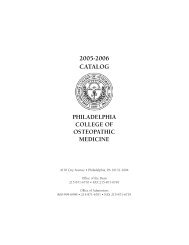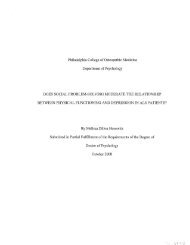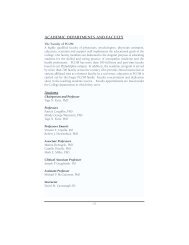0 - Philadelphia College of Osteopathic Medicine
0 - Philadelphia College of Osteopathic Medicine
0 - Philadelphia College of Osteopathic Medicine
You also want an ePaper? Increase the reach of your titles
YUMPU automatically turns print PDFs into web optimized ePapers that Google loves.
BiopsychosociaJ Effects Among Coronary Artery Bypass Grafting Patients 53<br />
Despite the general lack <strong>of</strong> significance among the research hypothesis, the overall<br />
data analysis revealed some interesting findings. An analysis <strong>of</strong> the Brief Cope-Emotion<br />
Focused Scale (M=1.67, SD=.38) and Problem Solving Scale (M=1.97, SD=.72), yielded<br />
mean scores that reflect an overall frequent response to coping, indicating that patients<br />
reported coping regardless <strong>of</strong> type. This also adds support for the findings that coping was<br />
a significant variable for this population.<br />
The Beck Depression Inventory (M=3.63, SD=1.98) reveals that the average<br />
depression score was below clinical findings. This is important in conjunction with the<br />
Cronbach's because it indicates that the population was not depressed and that it also<br />
responded inconsistently. This may suggest that the BDI-II may not be a suitable measure<br />
for this population; this population was uncharacteristically medically clean, or the truly<br />
depressed patients were not sampled.<br />
The Social Support Behavior Scale subscales revealed that patients' friends<br />
(M=2.13, SD=.84), and family (M=2.69, SD=.98), were highly likely to give multiple<br />
forms <strong>of</strong> support to participants. This finding, as stipulated in the literature, maintains<br />
lower depression scores and overall improved coping. This finding was not surprising,<br />
given the fact that most participants were married, educated and middle income.<br />
Further data analysis showed that participants' average responses on the MacNew<br />
(M=5 .67, SD= .88), reflected an overall high quality <strong>of</strong> life response. Most patients<br />
responded to not having difficulties specific to their heart disease. This supports the other<br />
results and findings that patients were generally not depressed, were coping, and were<br />
supported.<br />
Pain rating scores from the McGill (M=4.27, SD=8.86), reveal that participants<br />
did not report high intensity pain scores. However, it is <strong>of</strong> note that the standard deviation






